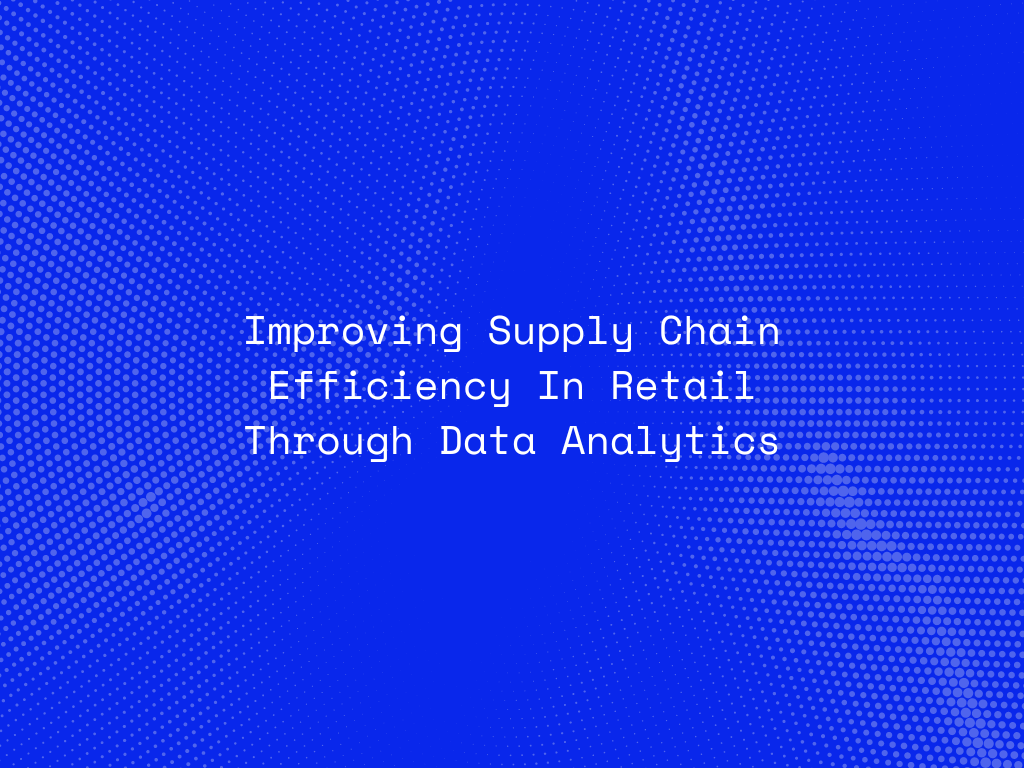The retail industry is in a constant state of change, and businesses are under intense pressure to enhance their supply chain management in order to remain competitive.
Improving retail supply chain efficiency through data analytics has become essential as it enables retailers to gain insight into:
– consumer behavior
– reduce costs
– optimize inventory levels
Retailers can spot trends and make smart choices by analyzing data from:
- point-of-sale systems
- social media
- customer feedback.
Businesses can predict demand patterns and adjust inventory levels using data analytics. Providentia’s cloud computing and data analytics expertise can help retail supply chains unlock data’s potential.
The Benefits of Data Analytics in Supply Chain Management
Supply chain management is a complicated process that moves goods and services from supplier to consumer. This process can be optimized and made more efficient with data analytics.
Organizations can use data analytics tools to analyze:
– sales
– inventory
– customer preference data
to comprehend the activities of consumers.
These insights can help companies make decisions based on:
– informed inventory
– pricing
– distribution decisions
Thus, companies can lower carrying costs, improve supply chain visibility, and increase customer satisfaction.Data analytics in supply chain management has many benefits, and companies that use it may gain a competitive edge.
Moreover, data analytics can help retailers anticipate demand and adjust their inventory levels accordingly.
Predictive analytics helps retailers predict:
– demand
– stock the right products at the right time
– avoiding stock outs
– lost sales
This data helps retailers optimize their:
– production
– shipping schedules
– reducing costs
– increasing efficiency
The Intelli-AI Platform – A Comprehensive Solution for Retailers
Providentia’sIntelli-AI platform provides a comprehensive solution for retailers seeking to enhance supply chain management.
This platform provides the following:
– demand forecasting
– inventory management
– personalization
– price optimization
– promotion optimization
– SKU rationalization
Retailers can accomplish the following by utilizing these features:
– Forecasting demand accurately and ensuring the availability of the right products at the right time will prevent stockouts and lost sales.
– Optimize their inventory levels to reduce carrying costs and enhance overall productivity.
– Personalize their marketing and promotions based on the preferences of their customers, thereby increasing customer engagement and loyalty.
– Optimize their pricing strategy in order to increase revenue and profitability.
– Rationalize their SKU portfolio to reduce complexity and cost.
The Three-Step Process – Strategy, Design, Implementation
Providentia’s three-step process of:
– strategy
– design
– implementation
ensures that retailers receive solutions tailored to their particular needs.
The initial step is to develop a strategy that aligns with the overall business objectives of the retailer.
The second step is to design a solution that makes use of the most recent technologies and best practices.
Implementing the solution and providing ongoing support and maintenance is the final step.
Latest Trends in Supply Chain Management
Supply Chain Management is a vital function for businesses to ensure the smooth flow of goods and services from the point of origin to the point of consumption.
Businesses are adopting data analytics, automation, blockchain, and IoT to improve Supply Chain Management.
Using data analytics businesses can analyze large amounts of data from:
– sensors
– social media
– supply chain transactions
It also enables businesses to identify:
– patterns
– optimize inventory levels
– forecast demand
– reduce costs
By automating mundane tasks such as inventory management and order fulfillment, automation helps retailers increase productivity. It reduces human errors and frees up time for employees to work on strategic tasks.
Supply chain visibility and transparency are improved by blockchain technology’s secure and immutable transaction records. It helps retailers comply with regulations and ethical practices by tracking products from manufacturer to consumer.
Retailers can track product movements, inventory levels, and supply chain performance with IoT sensors and RFID tags.
Traditional supply chains are becoming smarter, more efficient, and more sustainable due to these Supply Chain Management trends.
Revolutionizing Retail Supply Chain Management
The use of data analytics, such as the Intelli-AI platform provided by Providentia, can assist retailers in optimizing their:
– supply chain
– enhancing their profitability
– enhancing their efficiency
With the latest trends in supply chain management, such as automation, blockchain, and IoT, retailers can further improve supply chain efficiency and gain a market advantage.




